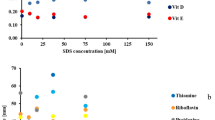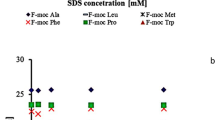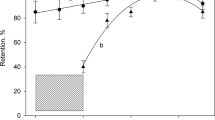Abstract
GORDON, MARTIN AND SYNGE1 and Consden, Gordon and Martin2 have shown that good separations of amino-acids can be obtained on filter paper by allowing a suitable solvent, which has previously been saturated with water, to flow over the paper in a closed container, the air in which is saturated with the vapours of water and the solvent. Filter paper contains 20–25 per cent water under these conditions, and separation depends upon the differences in partition coefficient of the amino-acids between the stationary water phase and the moving solvent. It has further been shown2 that for any individual amino-acid the value
This is a preview of subscription content, access via your institution
Access options
Subscribe to this journal
Receive 51 print issues and online access
$199.00 per year
only $3.90 per issue
Buy this article
- Purchase on Springer Link
- Instant access to full article PDF
Prices may be subject to local taxes which are calculated during checkout
Similar content being viewed by others
References
Gordon, A. H., Martin, A. J. P., and Synge, R. L. M., Biochem. J., 37, Proc. xiii (1943).
Consden, R., Gordon, A. H., and Martin, A. J. P., Biochem. J., 38, 224 (1944).
Author information
Authors and Affiliations
Rights and permissions
About this article
Cite this article
PARTRIDGE, S. Application of the Paper Partition Chromatogram to the Qualitative Analysis of Reducing Sugars. Nature 158, 270–271 (1946). https://doi.org/10.1038/158270a0
Issue Date:
DOI: https://doi.org/10.1038/158270a0
This article is cited by
-
Associations de chromatographie et d'électrophorèse sur couche mince de celllose amorphe pour la séparation des aminoacides. Influence des équilibires ioniques et des constituants des solvants sur les séparations chromatographiques dans le cas des solvants du type alcool/acide/eau
Chromatographia (1978)
-
Products of photosynthesis by marine phytoplankton: the effect of environmental factors on the relative rates of protein synthesis
Marine Biology (1974)
-
Study of the extracellular polysaccharides produced by a blue-green alga, Anabaena flos-aquae A-37
Archiv f�r Mikrobiologie (1973)
-
Failure of equilibrium dialysis to show selective monosaccharide binding by erythrocyte membranes
The Journal of Membrane Biology (1972)
-
Shift in the carbohydrate spectrum of root exudates of wheat in relation to its root-rot disease
Plant and Soil (1971)
Comments
By submitting a comment you agree to abide by our Terms and Community Guidelines. If you find something abusive or that does not comply with our terms or guidelines please flag it as inappropriate.



